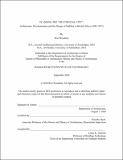Planning the "Multiracial City" : architecture, decolonization and the design of stability in British Africa (1945-1957)
Author(s)
Woudstra, Rixt (Rixt Laurien)
Download1288577126-MIT.pdf (7.315Mb)
Alternative title
Architecture, decolonization and the design of stability in British Africa (1945-1957)
Other Contributors
Massachusetts Institute of Technology. Department of Architecture.
Advisor
History and Theory of Architecture.
Terms of use
Metadata
Show full item recordAbstract
In the two turbulent decades before most British African territories gained independence, British authorities reorganized rapidly growing cities such as Nairobi, Kampala, and Accra by constructing state-sponsored housing estates for African families. This dissertation examines how these late-colonial housing projects were part of a larger effort to maintain control over British Africa during a moment frequently described by colonial officials as "instable," but which for many others held the promise of a different, independent future. I argue that British architects and planners collaborated with labor experts, sociologists, and social welfare workers to prevent anticolonial protests, labor strikes, and mass demonstrations, and to create a "stable" black working class. Building on archival research and fieldwork in Ghana, Uganda, South Africa, and the United Kingdom, I explore four interrelated architectural and spatial strategies employed by British colonial architects and planners: the promotion of the sociological construct of the "multiracial city" to reduce racial tensions; the creation of community centers to stimulate social cohesion; the design of built-in furniture to modernize the domestic sphere; the engineering of new building materials to improve the durability of housing estates. While the political process of decolonization is frequently discussed as a moment of rapid change, this dissertation shows that architects and planners, such as Alfred Alcock and Leonard Thornton-White, participated in the drawn-out negotiation between colonial rule and self-government. Their designs aimed to impede anticolonial struggles for self-determination, racial equality, and social reform and thus postpone the looming prospect of independence. This dissertation also investigates the British welfare state's imperial dimensions. The construction of late-colonial housing estates was entangled with the design of council flats in London, Liverpool, and other English cities. The case studies demonstrate that the principles of social welfare, founded on the ideal of a modern, more equal society, served to support a violent political system of extraction and labor exploitation abroad. The housing estates in Britain's African territories were presented as progressive investments to benefit local workers but were, in fact, designed to avoid uprisings that would interrupt Britain's lucrative supply chain.
Description
Thesis: Ph. D. in History and Theory of Architecture, Massachusetts Institute of Technology, Department of Architecture, September, 2020 Cataloged from the official pdf of thesis. "September 2020." Includes bibliographical references (pages 221-246).
Date issued
2020Department
Massachusetts Institute of Technology. Department of ArchitecturePublisher
Massachusetts Institute of Technology
Keywords
Architecture.